In July 1842, a circus came to town. Cornwall's Royal Olympic Circus proved to be a very popular attraction for the town attracting people from the highest levels of the gentry including members of the Morgan family.
Stars of the show were clowns, horse riders, tight-rope walkers and acrobats and scenes from the Battle of Waterloo and Kenilworth castle were performed.
The circus was held in an 'Arena' which was purpose built somewhere in the Clarence Place area.
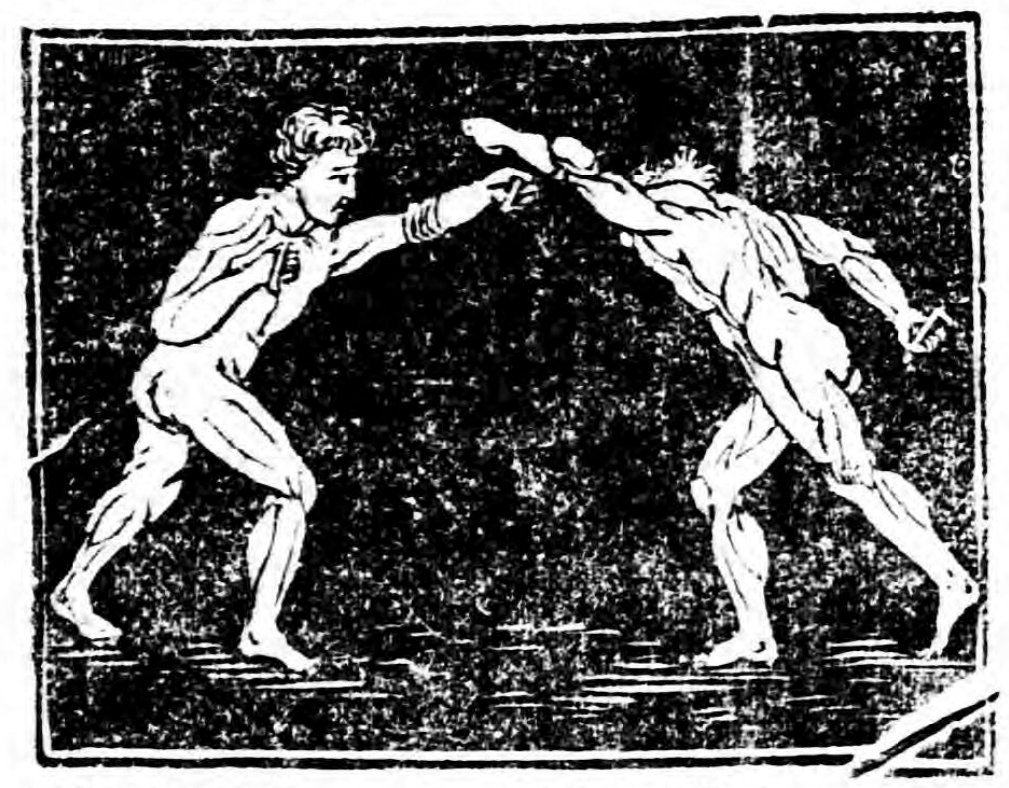
July Show Review
The Monmouthshire Merlin had a detailed review of the start of the circus.
The high reputation which the performances at the Arena last week established for Mr. Cornwall's unrivalled company, has been not only fully sustained, but greatly augmented, by the wonders he has presented to overflowing and delighted audiences during the present. The stupendous efforts and vast expense required in getting up a succession of novelties for the amusement of the public, entitle those who undertake them to that patronage and support which may repay them for their expenditure and labor.
In this respect, we are happy to observe that the exertions of Mr. Cornwall have been duly appreciated by the public, who have nightly crowded the Arena to overflowing and we believe we do but justice to Mr. Cornwall, in stating that for the kind and distinguished patronage with which he has been rewarded, he feels deeply grateful to the gentry and inhabitants of Newport and its vicinity. On Monday evening, as announced in the bills of the day, there was a change in the performances presented to the public, and the selection both for variety and splendour, did great credit to the discrimination and taste of the manager.
The Performances
The first piece was "The Village Rivals," in which the united talents of the three tight-rope dancers were displayed in a manner to call forth the unanimous applause of the audience. This was succeeded by Mrs. Cornwall (the equestrian heroine), who appeared as The Belle of the Louvre," and who, on a beautiful palfrey urged to the top of his speed, displayed all the agility, delicacy, and grace which have distinguished the most celebrated female artistes in the ring. She was frequently greeted with the loudest plaudits from all sides of the house, which she acknowledged, on retiring, by gracefully curtseying to her admirers.
Mr. J. Samwell, "The bold Aspirant," followed, who, by his splendid riding and perilous and successful feats, fully established his claim to the fame to which he so justly aspires. His six leaps over six garters in succession, as his horse flew with the rapidity of lightning round the ring, were truly surprising but even these were eclipsed by the bound he made in clearing two pieces of canvass placed alongside each other, in which he rose high above them, cleaving the air with more than the falcon's speed, and lighting, like gossamer, on the horse's back, several yards beyond them.
Monsieur Plege, the great French acrobat, followed, and delighted the house with his brilliant performance on the tight rope. M. Plege performs without the aid of a balancing pole, and dances on the rope with all the facility and grace which distinguish Cerito on the boards. He threw several somersets (sic), also, with as much ease as if he was springing from a stage.
Mr. Cornwall then appeared as Mehemet, King of Persia, superbly dressed in an eastern costume, for the purpose of introducing his "Symmetric Steed of the Elgin Marbles." This steed is an animal of great beauty of form, and marked in an exceedingly picturesque manner. Without bit, or bridle, or rider, she flew round the ring, or stopped, obedient to the signs of her master, who never spoke a single word. She curvetted, and halted, leaped poles, turned round, and leaped again with the docility of the best trained domestic animal. Still mindful of her master's dumb behests, she lay down upon the sand as motionless, and indifferent to the applause which her docility drew forth, as if she were in deep sleep. The training of this beautiful and docile creature does infinite credit to Mr. Cornwall, who must be deeply versed in the natural history of the species, and who has proved, in a very pleasing manner, the degree of intelligence it is capable of displaying, under the tuition of so able an instructor.
Mr. Mackintosh succeeded as "The British Man of War's Man," and delineated, on his flying courser, with great truth and fidelity, the characteristic traits of love and bravery which so honourably distinguish the British seaman.
We have not yet spoken of the performances of the two inimitable clowns, Messrs. Barry and Chapman, whose wit and humour enlivened the audience during the intervals between the different pieces. To pass over these provokers of mirth would be indeed to omit the character of Hamlet in the play, and, at the same time, to incur the charge of ingratitude for the fits of laughter which their genuine wit produced, every one of which might cure a quinzy (sic). Most clowns depend more upon contortions of body and feats of tumbling, than on real humour and the exuberance of animal spirits, but these two incomparable clowns, while indulging in sallies of the richest humour, and the most sparkling wit, are yet governed by that delicate sense of propriety, which renders their mirth agreeable to the chastest ears.
The evening's entertainments concluded with the grand spectacle of "The Lists of Ashby," produced under the sole direction of Mr. Sylvester. This superb scene (so graphically described by Sir Walter Scott, in the finest of all his historical romances), in which the whole of the company and stud appear, is a perfect realisation of the idea of that great writer; and the most astute archaeologist or antiquarian could find nothing to object to in the arms, accoutrements, costumes, or caparisons of their knights, their esquires, their attendants, or their steeds.
On Thursday there was a morning performance, which was specially ordered, and which was honoured with the presence of Mrs. Leigh, of Pontypool Park, and party; Mrs. Morgan, of Ruperra Park, family, and party several of the leading families in this part of the county, and the officers of the 11th regiment, at present in garrison here. The admirable band of the regiment was in attendance, and played several of their finest pieces in the intervals of the performance.
A Free Night for the Charity Schools
On this occasion we must not omit to notice that Mr. Cornwall, in the kindest manner, threw open the doors of the arena to all the children of the different charity schools of the town gratis, who had thus an opportunity which they otherwise might not have of enjoying the rich yet innocent amusements so bountifully provided by Mr. Cornwall.
Mr Lavater Lee
We have gone so fully into the performances already, that we cannot afford space to particularise this morning's entertainments, but constrained as we are for room, it would be injustice were we to omit particular mention of Mr. Lavater Lee, the celebrated and truly astonishing gymnastic performer, whose athletic feats drew forth the warmest commendations and the heartiest applause of the distinguished audience whom he so much delighted.
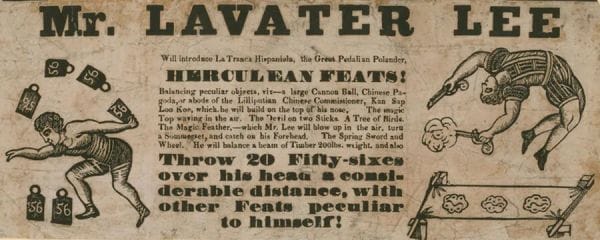
Mr. Lee threw upwards of one hundred somersets! (sic) — a feat we believe unprecedented in the annals of gymnastics. We would recommend all who have not seen this wonderful performer, to avail themselves of the present opportunity of witnessing his unrivalled feats, which we shall more fully describe in our next.
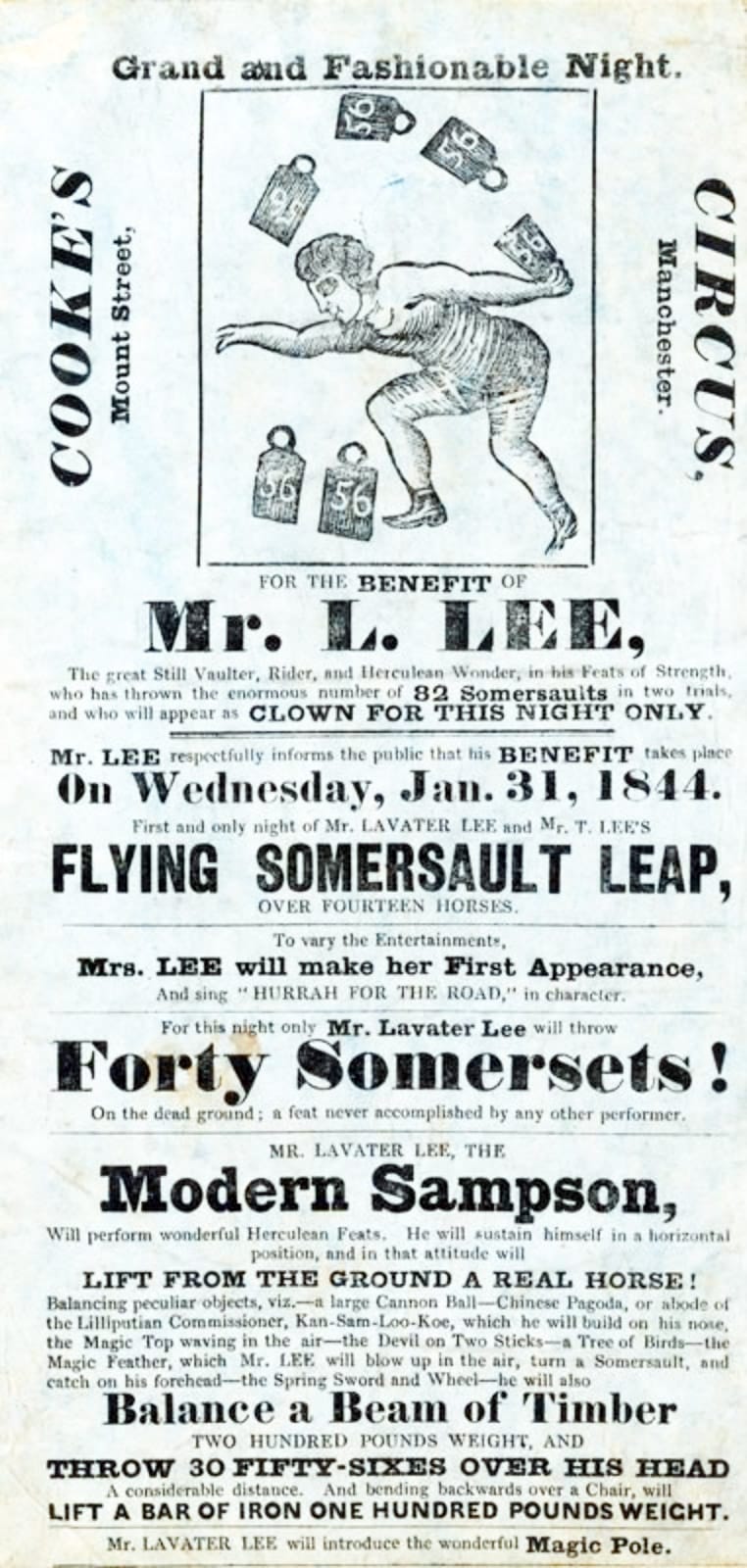
Donations to Charity
This evening the entertainments which on Thursday afforded such gratification to the numerous and fashionable company who honoured the Arena with their presence, will be repeated and the proceeds will be presented by Mr. Cornwall to such charitable institutions as may be pointed out by the mayor and magistrates. This is highly creditable to the liberality and benevolence of Mr. Cornwall, and we doubt not will be remembered on a future occasion.
On Wednesday evening, there will be a series of most brilliant entertainments by command of R. J. Blewitt, Esq., the respected member for the boroughs, upon which occasion, we doubt not, Mr. Cornwall will be honoured with a bumper.

Continuing Throughout August
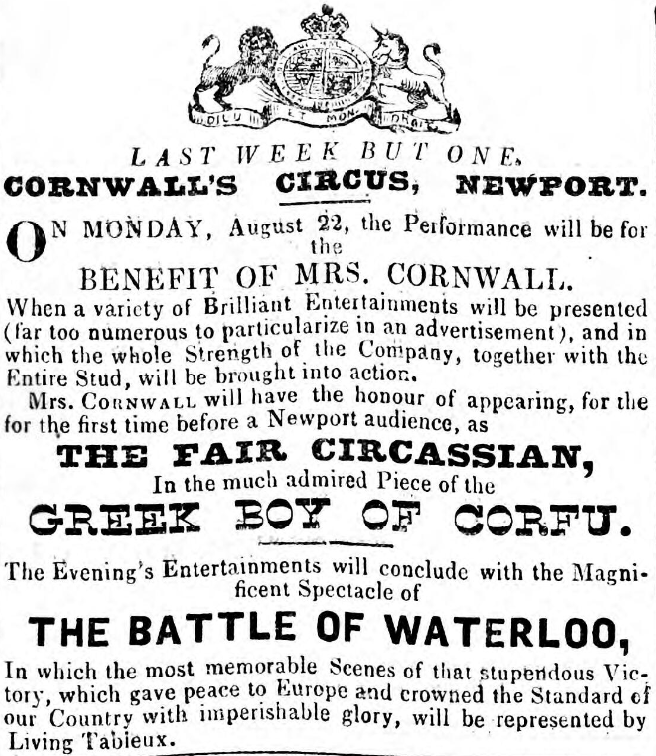
The circus continued throughout the summer attracting members of the gentry including Sir Charles Morgan and Octavius Morgan and something called the Carpenter's Arms Club.
This unrivalled place of amusement continues to be the chief point of attraction now in our town. It has had the patronage of the leading gentry in the neighbourhood of Newport, and is nightly crowded with delighted audiences. We regret we are to lose Mr. Cornwall Company soon, Thursday being the last sight they will nave the honour of appearing before a Newport audience.
On Monday night Mr. Cornwall's benefit takes place, under the patronage of Sir Charles Morgan, Bart., when a brilliant series of entertainments will be presented.
On Tuesday night, the general favourite, Barry, the Clown, will be patronised by the Carpenters' Arms' Club, and we doubt not he will have substantial reasons to remember Newport with pleasure.
On Wednesday night Mr. Sylvester, acting-manager, will be patronised by Octavius Morgan, Esq., M.P., and we trust that he also will have reason to applaud the liberality of the inhabitants of Newport.
— Monmouthshire Merlin, 27th August, 1842
The Last Nights
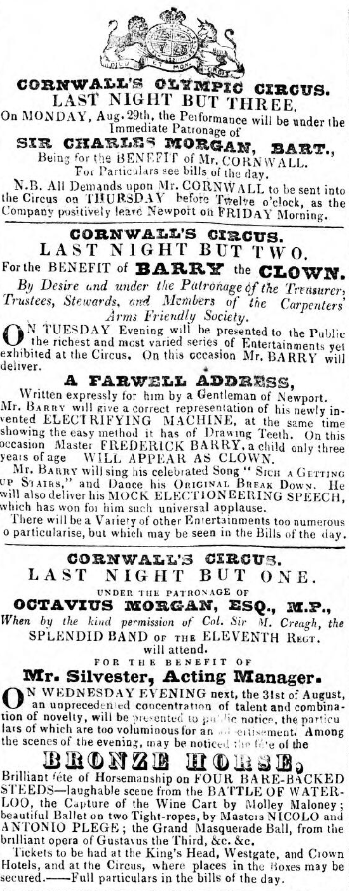
It appears from an advert in the Monmouthshire Merlin that the circus pulled out all the stops for its closing shows.
Last Night But Three
Sir Charles Morgan was in attendance.
Last Night But Two
Barry the Clown was in attendance with his newly invented 'electrifying machine' whilst showing the easy method it has of drawing teeth. Also in attendance was his three-year-old son who was dressed as a clown. He sang his celebrated songs and also delivered a 'Mock Electioneering Speech'.
Last Night But One
Octavius Morgan was in attendance and featured a Bronze Horse, a 'laughable scene' from the Battle of Waterloo ballet on two tight-ropes and a Grand Masquerade Ball.

1843
In the spring of 1843 after touring the west of England, Mr Cornwall's Circus returned for 12 nights only and featured a Pigmy Pony, a Spanish Bull Fight, Mr Lavater Lee and 'The Funnaments of the Clowns'.
As with most of the adverts, there's never any mention of the venue but an article published on 25th March, 1843 mentions a 'Pavilion' and I'm assuming it would have been in a similar location in Clarence Place.
He arrived here on Wednesday morning, and was engaged during that and the following day in arranging and newly decorating the Pavilion.
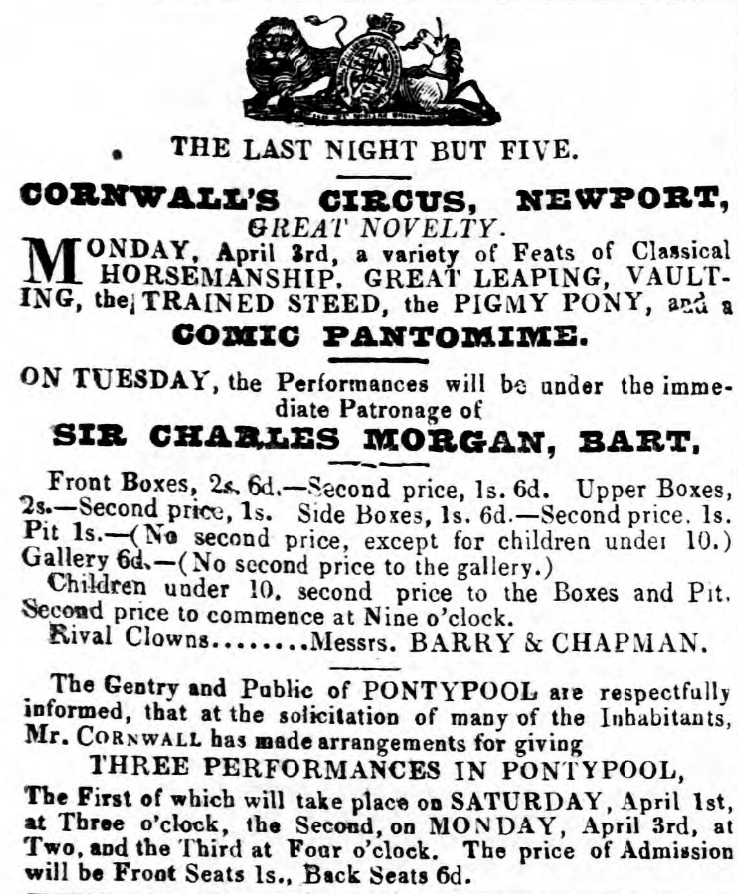
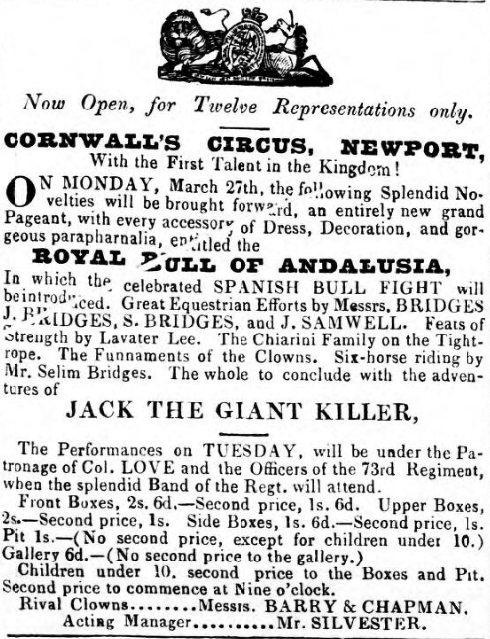
Monmouthshire Merlin,1st April, 1843 & Monmouthshire Merlin, 25th March, 1843
Another advert mentions Mr Cornwall making arrangements for the 're-embellishing, altering and refitting' the circus and it being 'one of the most splendid ever fitted-up out of London'.
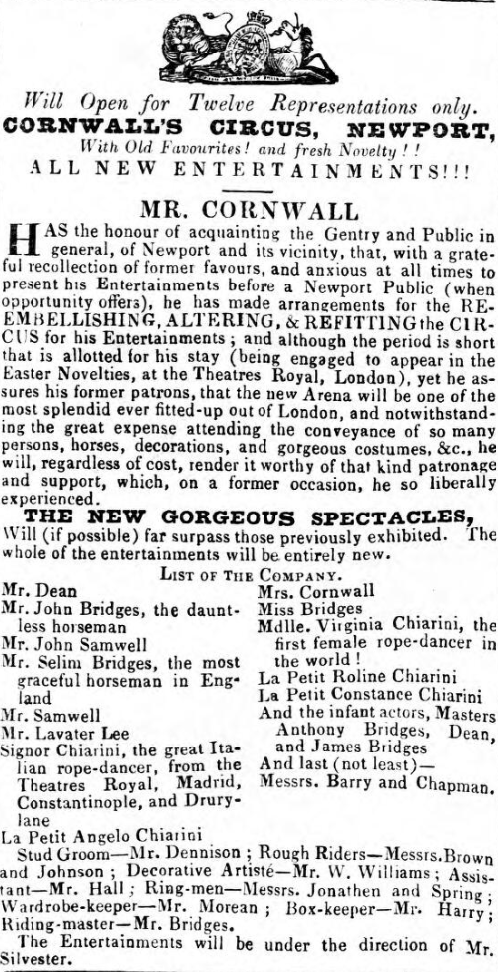

1845
A circus returned in 1845 for two days only and was organised by a different company — Cooke's. The offering was very similar to Mr Cornwall's and was likely held in a similar location in Clarence Place.
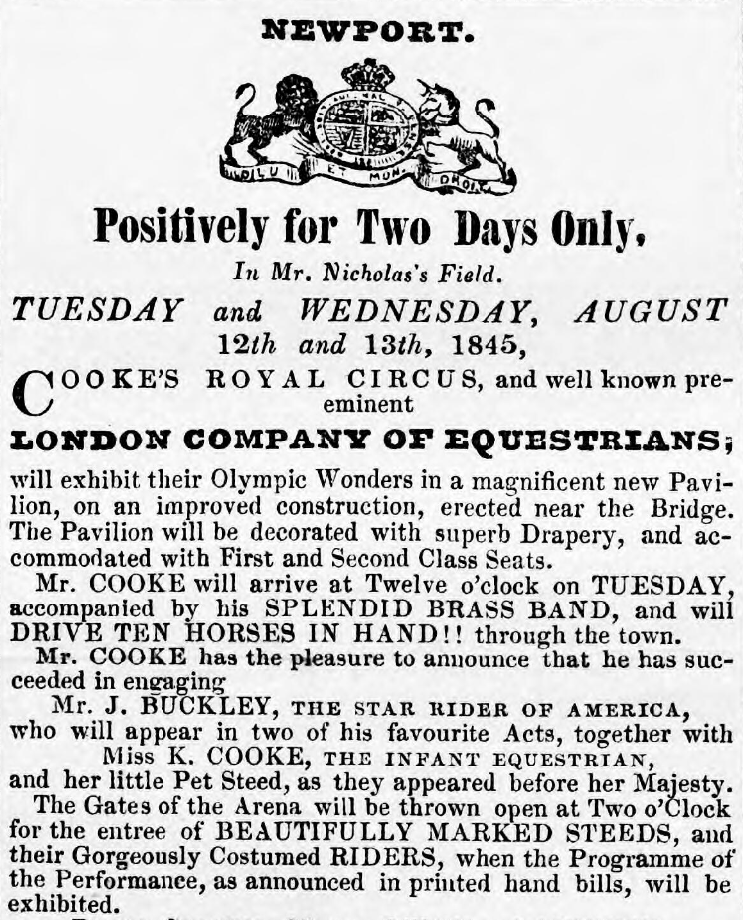
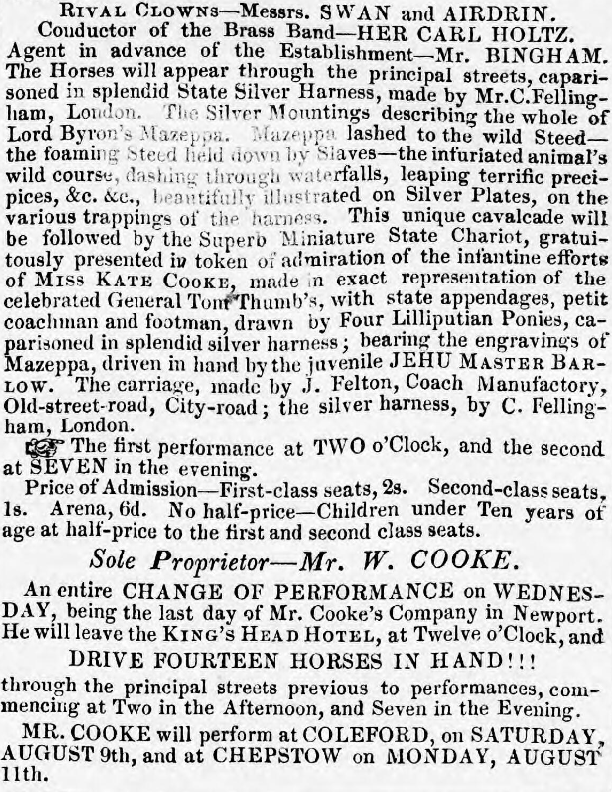

The Arena
The Merlin offered a description of 'the Arena' when it opened to the public in July 1842.
On Monday evening this splendid arena, which has been erected under the immediate superintendance of architects of great skill, was opened to the public; and in point of external structure and internal arrangement, it may vie with any other building of a similar nature in the kingdom, reflecting equal credit on Mr. Cornwall, the spirited proprietor, and the contractors.
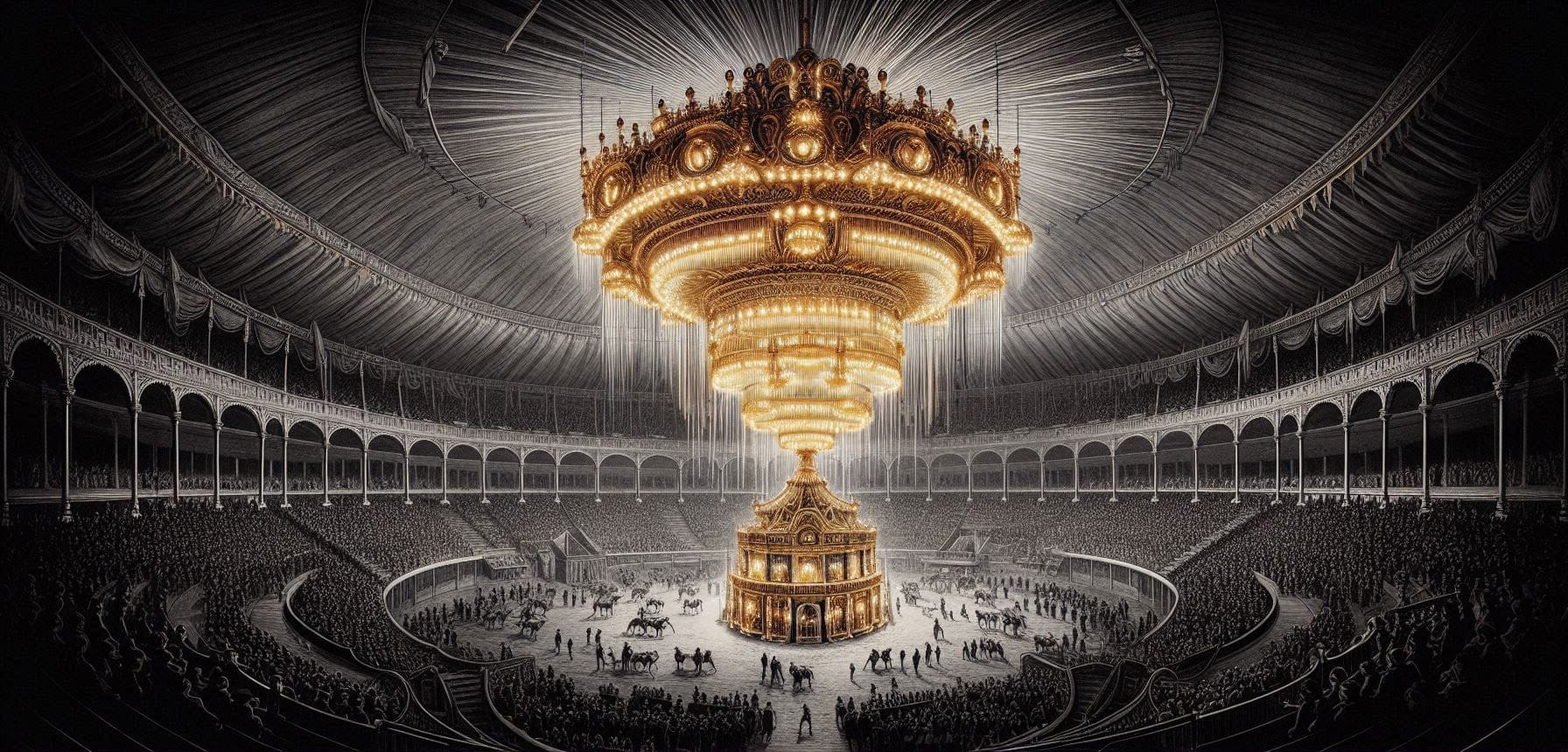
The centre of the building, containing the curriculum, 0r circus, is of vast extent, surrounded on every side by the audience, and lighted by innumerable jets of gas, from a colossal gold chandelier dependent from the roof, most richly and taste- fully ornamented, shedding a brilliant but not dazzling light on the "Magic Circle." The several divisions of the house — boxes, pit, and gallery — are so arranged that they have the advantage of different entrances, and are completely separated from one another, while the convenience of the occupants has been sedulously consulted in the arrangements required for the comfort of each. Such is the general outline of this splendid Amphitheatre.
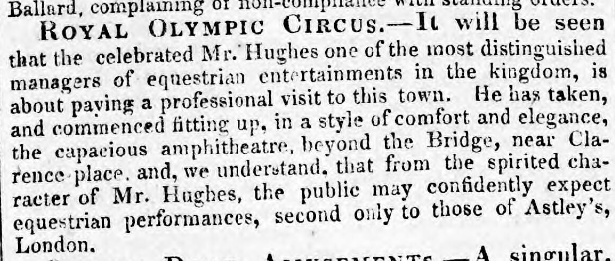
It doesn't describe the location of the Arena but an article in 1845 mentions the Olympic Circus being located 'beyond the Bridge, near Clarence Place'.
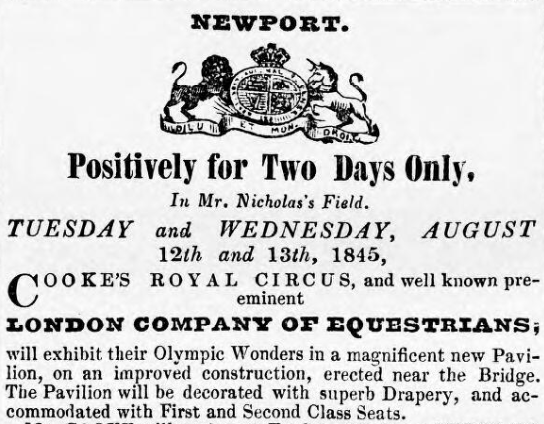
Also in 1845 is an advert which describes the location as being in Mr Nicholas's Field. The tithe map from 1840/1 shows the fields in the area owned by Mr Nicholas. The left two fields are probably unlikely candidates based on them being so close to the river and a little inlet being present. The one by the cenotaph is also unlikely due to its size and the fact that the weigh bridge was there. That leaves the other four which are the location of the present day Corporation, Bedford and Harrow Roads.
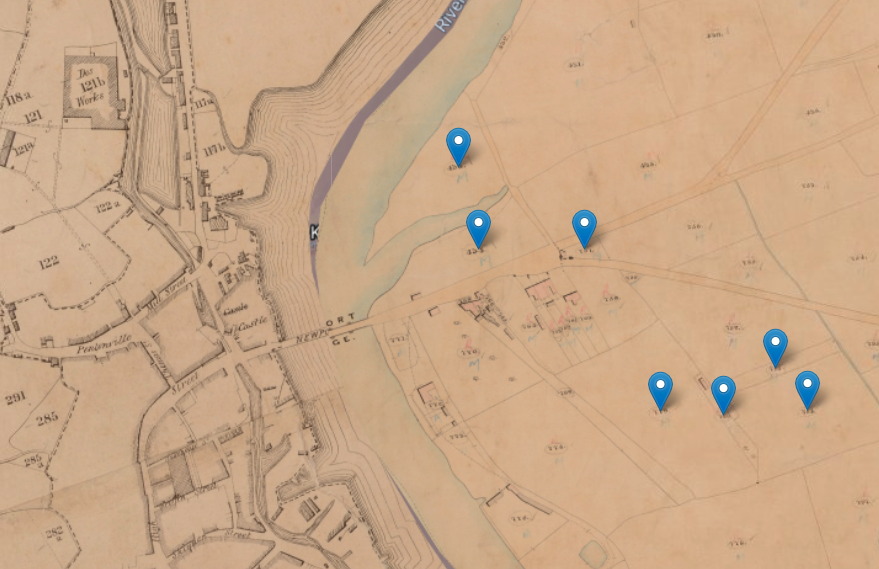

Example Bill Posters
These are examples of the bill posters that could have been seen around Newport in 1843. These are for events in London the month after appearing in Newport and there's a mention of the Electrifying Machine for drawing teeth!
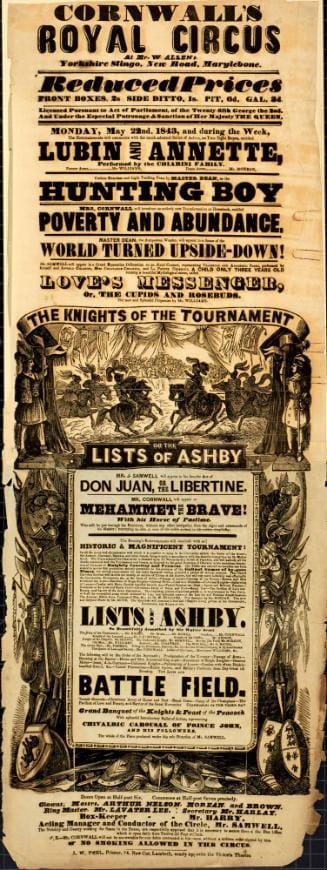
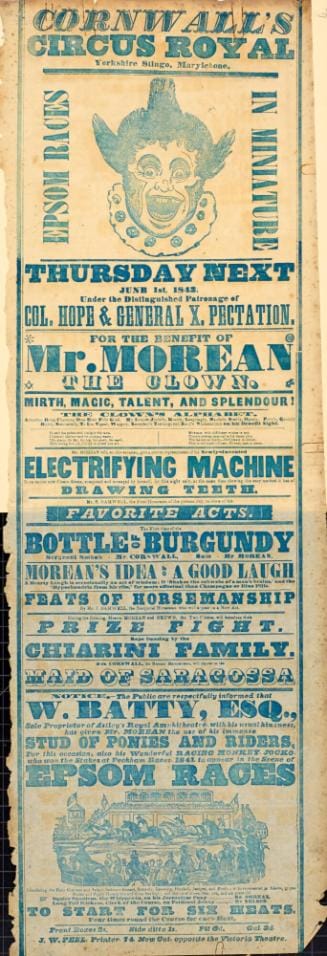



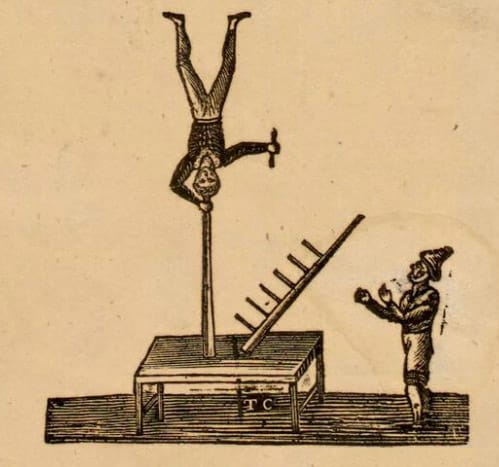
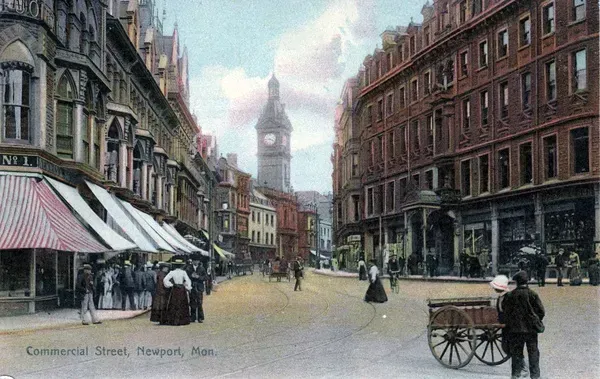
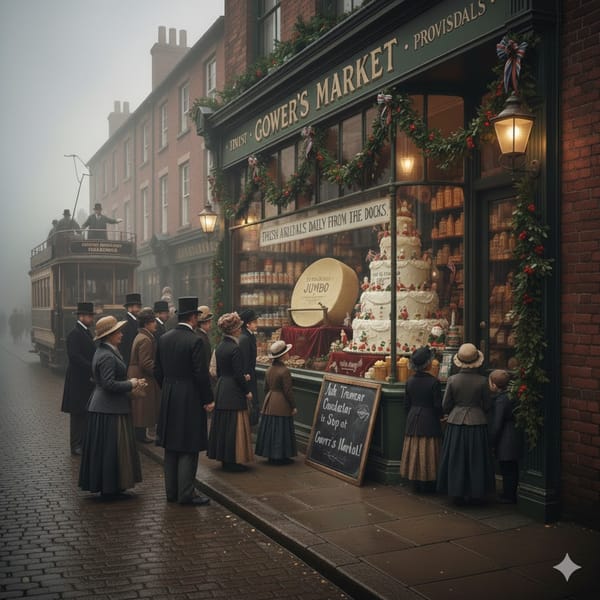
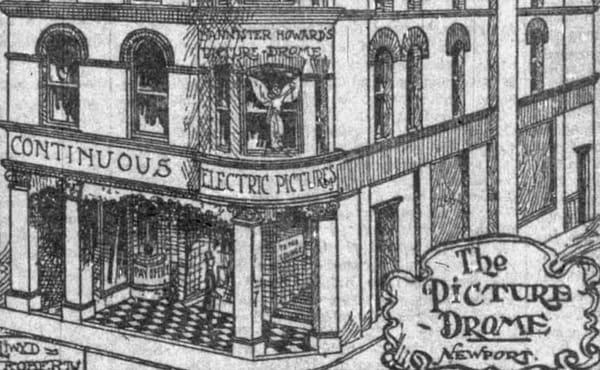
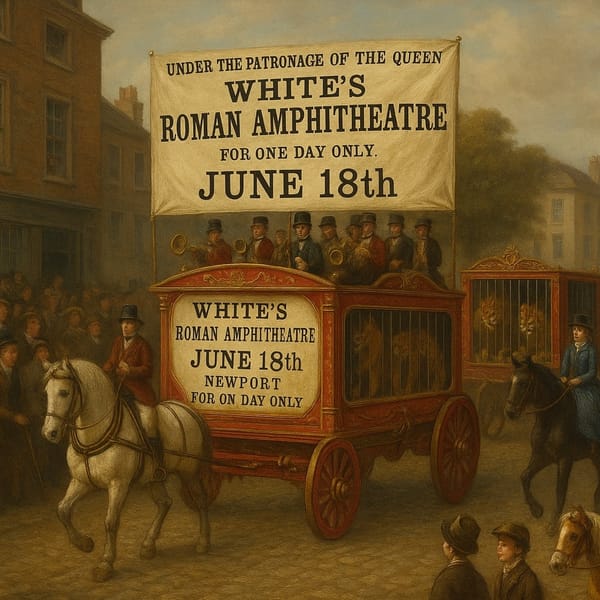
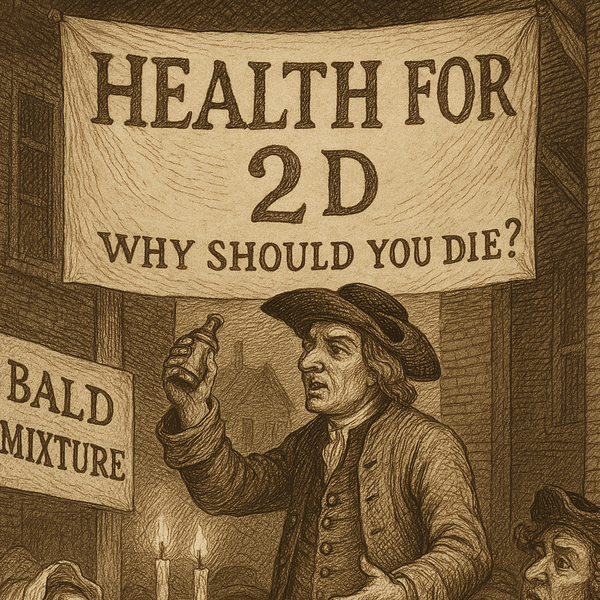
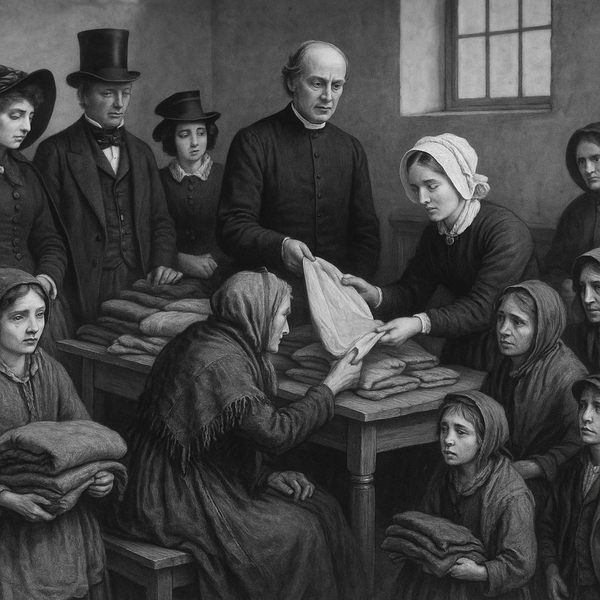
Member discussion